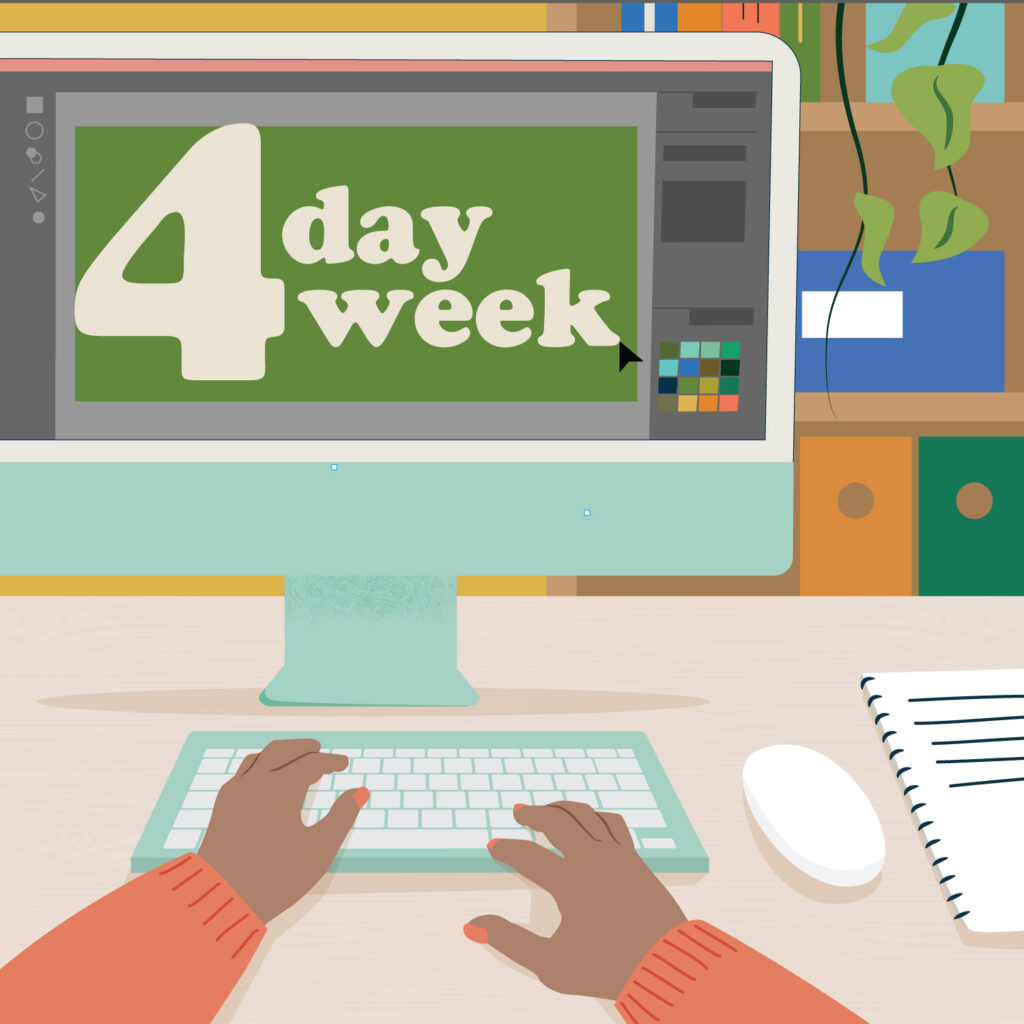
In late 2021 I was done, burnt out, tired, totally over it and limping towards a Christmas break. I put it down to the pandemic hangover, increased workload and a few projects that took a turn for the worst knocking my confidence and faith in humanity! Ultimately I knew something needed to change in my business but I wasn’t sure what. Over the days between Christmas and New Year, I read a pile of books on burnout, work and rest and I came round to the idea of a four-day week. I implemented it slowly over the next few months, and I’ve been (for the most part) working one since.
I discovered lots of evidence to show that a four-day week has heaps of benefits – from the mental and physical health benefits to individuals of less work to the wider benefits to communities, families and the economy. Increasing numbers of workers and businesses are coming around to working a four-day, or 32-hour, week as standard and embracing a work-to-live attitude, rather than live-to-work.
For salaried employees it’s a reasonably simple situation, your boss agrees to you working one less day. You now work one less day. Employees might get told what day of the week that will be, or if they need to make up the hours over the rest of the week but the broad strokes are clear. For freelancers, it is not quite so easy. There are more variables and consequences to deal with when making your plan, there are building blocks you need to put in place, and decisions you will need to work out before throwing yourself into three gorgeous work-free days every week.
How to get started with a freelance four-day week
Work out why.
What is your motivation for changing to a four-day week? Are you burnt out and in need of more rest and relaxation? Do you want to make time for a new hobby or project? Do you have caring responsibilities that it’s become impossible to fulfil within a standard five-day week? Are you trying to buy more time to work on a personal project related to your main job? Are you just over being told when to work and want the freedom to have a life away from your desk? All good projects start with a clear why and getting to the bottom of yours will make it easier for you to design your week in a way that works for you.
Audit your time.
The best place to start is with what your week looks like right now. An audit of your time will allow you to work out what you are spending your time on during a normal week and give you some clues as to how having a day less will alter the way you need to work. Does it mean working an extra half an hour on the other days of the week, or outsourcing some tasks to free up that time? Maybe it means being honest with yourself about how much time you spend refreshing Instagram or checking email multiple times each day, in which case you may need to think about creating more efficient systems or stronger boundaries. Perhaps it means ditching some things altogether.
Think about the money.
If you don’t alter your rates, dropping a day a week will likely mean you will earn less. Perhaps you are in a position where this is fine but if not you’ll need to alter your rates to account for your reduced working hours. Although I have never priced my services on a purely hourly or daily rate, knowing your base rate helps ensure you are at least covering your costs. Work out your base daily rate by calculating what you need to earn per year – including ALL your costs; overheads, personal spending, savings, pensions, debt payments etc, and allowing for wriggle room. Then divide that by the number of days you think you’ll work over the year under your new 4-day regime. Don’t forget public holidays and your own holidays and breaks. Divide the monetary figure by the number of days you’ve calculated, add a % based on the tax you pay in your region and that is now your new absolute baseline daily rate and, (hopefully, it goes without saying), you should work up from there when pricing projects! For more information about how to work out a price for design and illustration work check out my blog post.
Work out what is ‘work’.
If this day is going to be work-free, it’s good to get clear on what ‘work’ is and therefore what you are not going to be doing on your extra day off. Are you dropping all business tasks for the day? Or is it just client work that is off-limits for the day? Would working on your business rather than in your business on classed as ‘work’? Are admin tasks off the table, how about writing blog posts and posting on social media? Will you take work phone calls or attend Zoom meetings?
How flexible are you willing to be?
Is your non-work day a set-in-stone, gold-sealed decree or is it more of a guideline? What if a client has an urgent must-be-done-today-or-disaster request? Are you going to drop what you are doing and sort it out, or will you stick with your firm boundaries and say “I will pick this up when I am back in the studio on Monday?” What if you get a sudden burst of inspiration (anyone remember what they are?) and feel the NEED to work on something that very moment?
Decide which day of the week.
Do you want to make it a three-day weekend with a Friday or a Monday off or how about a Wednesday to break up the week? Perhaps you have other life commitments which control which day you will take, or maybe a partner, friend or family member also works a 4-day week and you want to be able to hang with them. Maybe there is a course or class you want to take on a specific day that guides your decision.
Work out what you’re going to do.
Do you see yourself having a lovely long lie-in, a late breakfast, PJs all day and giving your mind and body a much-needed weekly fix of relaxation? Or is it a day to do all the things you’ve been thinking about doing – trail running, paragliding, woodworking, dismantling the patriarchy etc? Perhaps you’ll be investing in yourself with exercise or courses? Or is it more about what is NOT OK to do – no sitting on the sofa watching Netflix for 6 hours, no heading to the pub at lunchtime and staying there, no using the extra day for boring household chores? Remember this is your extra day so whatever you choose to use it for is OK. It could be that getting the chores sorted before the actual weekend means you can enjoy a more fun Saturday and Sunday. You might decide that the only rule is that the day has to be full of things you want to do rather than things you have to do.
Set boundaries and communicate
Once you’ve decided on all the above, the last piece of the puzzle is to tell your clients. Communicate your new working hours clearly, set expectations from the get-go, and update the information on your website and email footer. You don’t need to overexplain, a simple note advising them of your new hours and when you are contactable is all that’s needed. Most clients are surprisingly cool when they know what to expect. And if they are not, then they’ve just outed themselves as a douchebag client that you probably don’t want to work with anyway! 👋
Deal with guilt before it happens.
It is easy to feel like you are slacking off when the rest of the world appears to be grinding away. That is because we’ve been taught that busyness is a badge of honour and only ‘hard-working’ people get the prizes. Many of us have worked in environments where our worth was determined by how many hours we were seen at our desks rather than the quality of our output. That is a freaking stupid way to run any business, not least your own. Being good to yourself, giving your mind and body the required rest and ensuring you do all the extracurricular things that light you up, are key to getting quality results. And quality results are why we are in business.
Is it worth it?
Short answer? Yes, categorically.
I chose Fridays as my day off and I’ve enjoyed long weekends, trips out and lazy days hanging out in my PJs (I gave myself quite a bit of freedom in that department). I also use the day to head to the gym, sort the garden, develop a new hobby, see friends and family and yes, catch up on some of those boring chores. Full disclosure, not every Friday has been work-free, I wrote some of this blog post on a Friday afternoon and there have been occasions when something has to go to print or I’ve been enjoying working on a project and didn’t want to lose momentum. But the key difference is that I feel in control of that, my clients know it’s out of the ordinary (or, more likely, don’t actually know it’s happening) and it’s never, ever a full day’s work.
And the outcome? I am more energised, more creative, and, dare I say, a happier human. My projects benefitted from a refreshed, more playful approach and my attitude to work has improved. The extra day of freedom has given me space to breathe, nourish other parts of myself away from work, and ultimately show up more engaged for the work I love.
If you’re toying with the idea of a 4-day workweek, consider this your nudge towards giving it a go. It’s not just about working less; it’s about working smarter and making space for the things that you love outside your work.

